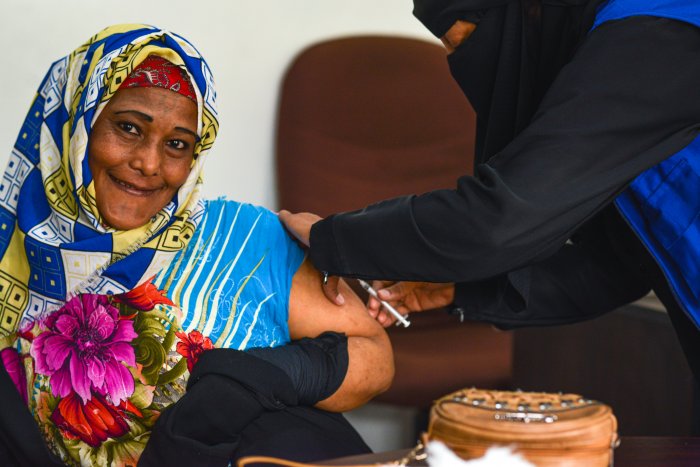
As of 19 April 2021, over 793 million COVID-19 vaccine doses have been administered across more than 100 countries. The pace of inoculation is picking up day by day and the world is hopeful that the light at the end of the COVID-19 tunnel is within sight.
The success of national vaccination campaigns depends on how inclusive and equitable they are.
But as public health experts, policy advisors and government decision-makers continue to draft and implement their respective national vaccination plans, there are serious concerns that some members of vulnerable communities may be excluded from vaccination drives, even if they are mentioned on paper.
Some of the hardest to reach and most at risk of being left out are migrants living, working and meaningfully contributing to our societies, particularly those who have irregular residence status. They are our delivery drivers, construction workers, carers, cleaners, nannies, cooks and street vendors, that knit the fabric of our communities. Many once had visas or permits, but fell between the cracks of our immigration systems. They may be adults, children, or older people, and many have lived for years in the country where they may be unable to get official authorization to reside.
For migrants in irregular situations, the pandemic and related lockdown measures have made life infinitely harder and exposed them to new risks, especially if they are homeless or living in cramped, precarious conditions where physical distancing is challenging and access to running water is limited. Some lost their jobs because of the socioeconomic repercussions of the pandemic; others had to keep working – either because they work in essential sectors or because they could not afford to miss a day of income – without adequate protection.
There is strong evidence now that poor families and ethnic and other minorities have been disproportionately affected by the pandemic and are more likely to have poorer health outcomes. Added to this, living with irregular migration status often means restricted access to health services and information, and poor trust in authorities because of immigration control measures.
In the European Union and elsewhere, several countries have already made clear their intention to include migrants with irregular status in their vaccine roll-outs. The Dutch and Spanish vaccination strategies mention them explicitly. In France, it has been announced that vaccines are to be free for all and no health insurance card will be required. In Italy, it was announced that the vaccines will be available to anyone living in the country, regardless of their residence status. The United Kingdom’s guidance states that the vaccines are available for free including for anyone living in the country “without permission,” and that “no immigration checks are needed” for people seeking COVID-19-related health services.
Other countries across the world have sought to create enabling environments, for example, by temporarily granting all migrants equal status to nationals for social and health benefits, by regularizing large groups, or by preventing health authorities from sharing patients’ data with immigration enforcement during the pandemic response to protect against the risk of deportation.
With these encouraging policy developments, many questions remain about the details of implementation. What is already clear is that for migrants with irregular status who are part of the groups prioritized due to higher vulnerability to infection – such as frontline workers, people with comorbidities or experiencing homelessness – proactive outreach to make them aware of their rights and how to access the vaccine is critical.
Source: IOM







